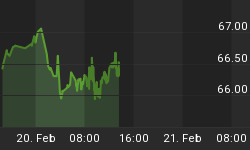Monetary inflation*, despite its popularity as a 'cure-all' during times of economic stress, can't possibly bring about an increase in total wealth. It does, however, cause a re-distribution of wealth because a) some people figure out what's happening well before others, b) it benefits the asset-rich at the expense of the asset-poor, and c) it benefits debtors at the expense of creditors, at least until creditors begin to fully anticipate the effects of the inflation and adjust interest rates accordingly.
Ultimately, inflation leads to wealth destruction because it distorts price signals, causing investment to be misdirected. It is this particular effect of inflation -- the misdirection of investment and the resultant booms/busts -- that we will focus on today.
Since 1971 the ability of governments and central banks to inflate has been unfettered by any official link between paper money and gold. Not coincidentally, since this time there has been one inflation-driven boom/bust cycle after another with each boom in a market being followed by a bust in that market and a boom in a different market. Some of the most notable examples of this rolling boom/bust sequence are:
1. The 1970s boom in commodities and bust in the US stock market
2. The 1980s bust in commodities and boom in the Japanese stock market
3. The 1990s bust in the Japanese stock market and boom in technology, telecom and internet stocks
What happened, over and over, was that inflation boosted prices in one sector more so than in others, causing investment to pour into that sector. A boom followed, but the massive in-flow of investment inevitably led to huge over-valuation and/or a capacity glut. The stage was therefore set for the subsequent reversal (bust) and for the next round of inflation to cause a boom somewhere else (under the current monetary system there will always be a next round). Naturally, the most likely candidate for the next boom was a sector that had experienced a relatively small amount of new investment during the preceding one or two inflation cycles.
During the current decade it is obvious -- at least to us -- that gold, commodities, and real estate have been, and will continue to be, the main beneficiaries of the inflation, although we are much more confident about the long-term bullish case for gold and commodities than we are about the long-term bullish case for real estate. As we've explained in the past, the real estate boom could persist until the end of this decade, but this is not something we'd be comfortable betting on due to the high valuations and the fact that a lot of real estate is owned by people who are up to their eyeballs in debt (weak hands, in other words). We are, however, very comfortable betting on a continuation of the booms in gold and commodities.
This decade's bust should continue to play-out within the tech, telecom and internet sectors that led the charge during the 1990s. In terms of nominal price changes the worst of the bust might be over for the 'boom stocks' of the 1990s, but the next major boom in these stocks probably won't begin until around 2020 (after a boom has ended it seems to take around 20 years for the conditions to be right for another boom to begin in that sector). There will be good rallies in these former high-fliers from time to time just as there were some good rallies in gold and commodity stocks during the 1980s and 1990s, but investors will, in general, be best served by focusing on the sectors that are presently in powerful long-term upward trends.
*There is actually no other kind of inflation, but we thought we'd say "monetary inflation" to make it absolutely clear that we are referring to an increase in the supply of money and not to an increase in a price index.
















